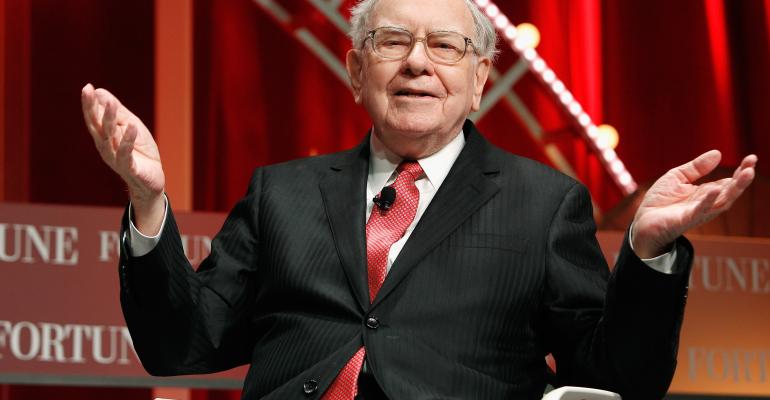(Bloomberg) -- Private equity firms, which are attracting record amounts of investor funds, have for years faced criticisms that they game their returns. Over the weekend, billionaire Warren Buffett joined the chorus.
The Berkshire Hathaway Inc. chairman and chief executive officer said firms make their performance appear better than it is. Firms will include money that’s waiting to be deployed, such as funds sitting in Treasury bills, when charging management fees. But they’ll exclude those funds when calculating the internal rate of return -- the performance measure in which most funds are judged, Buffett said.
“We have seen a number of proposals from private equity funds where the returns are really not calculated in a manner that I would regard as honest,” Buffett, 88, said Saturday at Berkshire’s annual shareholder meeting in Omaha, Nebraska. “It’s not as good as it looks.”
Representatives for the largest private equity firms either didn’t immediately respond to a request for comment on Buffett’s allegations, or declined to comment by deferring to the American Investment Council lobbying group.
“Pension funds across America choose to invest in private equity because private equity investments historically outperform the public markets and deliver substantial benefits to public servants and retirees,” AIC President and Chief Executive Officer Drew Maloney said May 5 in an email.
Read more about the profit-goosing scheme from some buyout firms
Verdad Advisers founder Dan Rasmussen, who runs a firm that can compete with the private equity model, said “there are tons of issues” with internal rate of return. “The fact that IRR math is easily gamed is extremely well-known,” he said.
Private equity firms are seeking to rush money out of deals quickly, and shorten the time during which they calculate the returns, said Rasmussen. If you take the same results over the decade of a private equity vehicle, returns would look a lot worse. The increased use of dividend recapitalization also is spurring more borrowing to boost stated returns of funds, he said.
"You didn’t sell the company, all you did was put on more debt and pay yourself a dividend," said Rasmussen.
So-called public-market equivalents are a better way to track performance, he said. By that method, buyout firms are trailing stock markets, according to a study by Pitchbook published in September.
Cambridge Associates has found that PE firms can inflate performance with their math. But the biggest investors are savvy enough to see through it, said Andrea Auerbach, global head of private investments at Cambridge Associates, which manages funds on behalf of endowment, foundation and pension clients.
‘Jedi mind trick’
“While PE funds are highly focused on fund-level performance and some may be pulling out all the stops and stopping at nothing to post strong returns, sophisticated investors cannot be ‘Jedi mind-tricked,’ and know to dig deeper,” Auerbach said in an email. Investors “need to ask questions beyond the fund-level IRR” to understand a PE firm’s capability.
Researchers at asset manager AQR Capital Management cited the “gameability” of the IRR method in a January report detailing private equity’s expected returns. They also preferred the public-market equivalent approach.
To contact the reporters on this story:
Hema Parmar in New York at [email protected];
Sonali Basak in New York at [email protected]
To contact the editors responsible for this story:
Michael J. Moore at [email protected]
Dan Reichl, Margaret Collins
© 2019 Bloomberg L.P.

